- Home
- William Styron
Selected Letters of William Styron Page 8
Selected Letters of William Styron Read online
Page 8
I hope you had as pleasant a Christmas as I did, and that all is going nicely with you in this first part of the New Year. Thanks again so much for the book. I’ll sing “Shenandoah” for you tonight.
As ever,
Bill S.
TO WILLIAM C. STYRON, SR.
March 31, 1949 Durham, NC
Dear Pop,
It was good to get your letter with all the fine encouragement and advice, and I would have written sooner, except for the fact that I’ve been giving your “proposition”—which was so generous—some serious thought. I know it isn’t easy for you to do it, and that’s one reason the thing troubled me, but I’ll gratefully accept, provided you take to my counter-proposition: that it be in the nature of an informal sort of loan, to be repaid when I’ve made some money at this writing game. That, of course, is a wild sort of statement, since heaven only knows when I’ll make enough to pay it back. But in this miraculous country of ours anything can happen, so it’s at least worth the try. At least be assured of this: that with your backing I won’t stop until I’ve reached the goal. This time it’s all or bust, and it’s got to be all. And I’m grateful to you for your help, more than you can know.*j
Now here’s something which you may or may not take to. Between Haydn and myself we have finally—after much talking and letters back and forth—agreed that perhaps the novel I’m now engaged on is worth postponing, in favor of another project less ambiguous in conception, and perhaps less ambitious. This new novel I have worked out in my mind is, unlike the other, concerned with just a few characters (too many characters I fully believe, is the stumbling-block of a first novelist), is concise in its conception, and, best of all, is much shorter, viz., it can be worked out thematically in a more or less predetermined number of pages. It’s actually what I should have started on a year ago.*k
But all this only leads up to the fact that Haydn and I both think that I’d do better back in New York where, as Haydn puts it, “Uncle Hiram can keep an eye on you.” For one thing my work in the last few months seems to have slacked off down here; maybe it’s the atmosphere; maybe I need a change of scene. For another thing, sad but true, I guess I do need someone to throw a whip over me, someone like Haydn, until I get to the point of having enough confidence where I can wield the whip myself. At any rate, it’ll be the last move for some time for me. I do know that your environment doesn’t have too much to do with what you write, but I feel I’ve exhausted everything that Durham has to offer and that New York, with all its chaos, will be a better place to work off this first novel. The furniture I can keep in safekeeping at Brice’s until I have need for it.
Enclosed is Haydn’s last letter—after I had written him, agreeing that I should come back to New York as he suggested. It shows, I think, that he has my best interests at heart still, despite my recent defection. I’ll probably leave here the last week of April.
Thanks again for your kind offer. I think it’ll be best for me all around. It’ll give me something added to work for and to live up to. Let me hear from you soon.
Your son,
Bill, Jr.
Styron returned to New York in April and Agnes de Lima helped him find a cheap, temporary apartment in Flatbush, Brooklyn.
TO WILLIAM C. STYRON, SR.
May 2, 1949 1506 Caton Avenue, Brooklyn, NY
Dear Pop,
I am writing this letter from my new home in—you wouldn’t believe it—Brooklyn. I arrived in New York a little over a week ago, immediately began hunting around for an apartment, but found that places to live in are still terribly difficult to get, even though I had heard beforehand that things had loosened up somewhat. The last isn’t true at all. You’d think that everyone in the country had converged upon New York, and that each was making a concerted effort to get an apartment, room—even an alcove somewhere. I suppose that it all involves some terrifically complicated economic theory, but it still strikes me as being a gigantic sort of fraud—that one has to knock his brains out and pay away his soul to boot to be able to get a roof over his head and a minimum of the necessities of life. I guess it’s merely the fact that I’m politically naïve, and that the way to knowledge is mainly through experience—such experience as I am going through now. I suppose, too, that 99% of the radicals, so-called liberals, and Communists are only that way, not through any a priori, bookish idealism, but because they were broke once, or out in the rain, and had to turn to some politico-economic father confessor. Which from my point of view is all the more reason for bucking life as you see it—artistically speaking, that is—or accepting it, or making the most of it—writing about it faithfully, in the long run, and not getting mixed up with the soothsayers. I suppose that if you really catch hell from life—as an untouchable, say, or a sharecropper—your artistic instincts wither, and you become political. That’s natural enough. But Americans are political enough as it is. We’ve got nearly everything, and we still bitch about this and that at every turn.
Which is all by way of saying that though I somehow resent not being able to settle down in a cozy Greenwich Village apartment at $40 a month, I am still glad to be in Brooklyn in a clean and decent place; and although there are no doubt better places in New York I’m not going to get angry and political about it and start joining the Communist party.
Actually I hope I’m not giving the impression that I’m complaining, because this is a pretty nice place by anyone’s standards. It’s in an old weatherbeaten house overlooking Prospect Park. There are plenty of trees around, plenty of grass, and big windows to look at the grass through. I’m in an apartment on the ground floor—two rooms, bath, kitchen, all furnished, $70 a month—the rent being impossible were it not for the fact that I am—or will be in June—sharing the apartment with Bob Loomis of Duke, who is coming to N.Y. to get a job. Split, the rent will be $9 a week, utilities included, which isn’t bad. The apartment is owned by a nice, easygoing woman who seems anxious to please. She’s educated, runs a school for backward children down the block.
I’ve seen Haydn, and I’m ready to go; in fact, I’m more than ready. I’ve already started the New Novel.
For some reason, although I’m not exactly ecstatic about the world and life in general, I’m very happy. I don’t know why that should be, as I’ve always thought of myself as an exceptionally melancholy person. Maybe the melancholy was merely adolescent, and maybe, though I can’t really sense it, I’m growing up, or reaching an “adjustment,” as the psychologists say. Whatever it is, it’s nice.
It’s not love—love of a girl, that is, because I haven’t found her yet. It’s not the excitement of being in New York, because I’ve been in New York before and now know how to take with a grain of salt its synthetic stimuli (though I still love New York). Actually I don’t know what it is. For the past four or five days I’ve been alone, not seeing anyone or talking to anyone I know except over the phone. Ordinarily this aloneness would have made me miserable, utterly wretched. But I haven’t minded it at all. I haven’t drunk hardly anything—a few beers, that’s all. And yet I’ve been quite content, suffused with a sort of pleasant well-being that demanded really nothing strenuous of myself, or of anyone else.
Perhaps it’s merely that I’ve gained a measure of Emerson’s self-reliance. Perhaps it’s just that, for some reason I can’t put my finger on, I feel surer of myself than I ever have before—more confident of my worth and my ultimate success, and less fearful of failure. I used to like to drink by myself. I still do occasionally, but gradually I’ve found myself stopping after the third beer, because there seems to be none of that fake pleasure in it anymore.
Maybe—again for some reason I haven’t quite been able to analyze—I’m finding that life excites me, appeals to me in a way I’ve never felt before. I still have awful moments of despair, and I guess I always will, but they don’t seem to be as overpowering as in the past. I don’t take so much pleasure in my despondency any more; I try to throw my bleak moods off—which again per
haps is a sign that I’m growing up.
I don’t know how this novel will turn out. Naturally, I hope it’s good. But best of all is the fact that I’m not afraid of its being bad, literarily speaking, provided I know I’ve done my best. In the meantime I’m taking great pleasure in living, and in being alone without being a recluse. At night, after I’ve worked through the day, I walk up Church Avenue to Flatbush and thence down Flatbush, enjoying every minute of the walk. The faces are all Jewish, all harried and metropolitan, all enormously middle-class; yet as I say it’s somehow all of a sudden wonderfully exciting. Maybe it’s just forgetting one’s self for a minute, not trying to be smug and self-centered and aloof. And I’ve learned to do finally—at least with far less effort and self-consciousness—something that three or four years ago you told me was one of the touchstones of maturity: being nice to people even when they’re not nice to you.
There’s something hideously crass and gaudy and meretricious about modern life; not that it hasn’t always existed, but that it increases proportionally with time and with Science. God seems to be at times nothing more than Someone playing a neon-colored, television-equipped pinball machine. Yet I’ve found that although it all revolts me horribly at times, I can take it much more in my stride than I could before. I hate the way people think, especially in America; I’ll always hate the stupid and the bat-brained and the petty. But it doesn’t seem nearly so important anymore to hate, as try to understand.
Now I can look at two ignorant, slack-jawed, bloodshot men in a bar talking about the horseraces at Jamaica, and I think I can understand. At least I try to understand. That’s one of the things, I guess, that Christ wanted one to do. Not that I’m getting religious all of a sudden, but I think He’d approve.
It’s incredible how one runs about frantically at times like a rat in a maze, not really knowing right from wrong (and often really not caring), victim of one’s own passions and instincts rather than master of one’s own soul. I suppose the proper thing to do is just to stop every now and then and say, Where am I heading? Actually, though I’m still much like the psychologist’s rat, I find myself asking myself that question almost too often. I suppose the very fact that I realize my indulgence in too much introspection is another sign (I hope) of maturity. Too much brooding is unhealthy and, although I still have my slumps, I’ve begun to realize that one of the great secrets is striking a balance between thought and action. Between the Romantic and the Classical. Just living healthily. Living, acting, thinking; not just vegetating neurotically, on one hand, or blundering about, on the other hand, like so many people do, like trapped flies. It’s a hard balance to strike, but I think it can be done, and that in this exciting-sorrowful age of ours it can make great literature.
Well, I’ve written more than I had thought. I’ve got to get up early tomorrow—another innovation!—so I’ll close now. I hope everything at home is going along okay, and that you’ll write soon.
Your son,
Bill, Jr.
In June, Agnes de Lima offered Styron her weekend home in Valley Cottage. Styron lived there for a year with her daughter, Sigrid.
TO WILLIAM BLACKBURN
July 23, 1949 Valley Cottage, NY
Dear Professor Blackburn
Since I’ve hit against shoal water, to quote an original metaphor, in the composition of my novel, I thought that now would be as good a time as any to belatedly apprise you of my recent doings. The momentary pause in the novel is, I assure you, only momentary; each time I finish a section I have a day or two in which I bleakly cast about for the next thing to write about, while at the same time assuring myself that it’s a folly, and an outrage to go on any further. I always manage, however, to proceed somehow.
Perhaps you’ve been informed, but I am now living with friends of mine, the de Limas, at their house in Valley Cottage which is about 25 miles up the Hudson from New York. It’s a delightful place to live and to work, and the de Limas—mother and daughter—are among the most exquisite humans who ever lived. Since I’ve been here—a little over a month—I’ve completed a good-size short story which I think is quite satisfactory and which is now going the rounds, and I’ve recommenced steady toil on the Peyton novel—following your advice and others’ and my own conscience—and I find it goes remarkably well. Maybe it’s just the atmosphere and the delightful and constant stimulation of my friends, but I’ve never yet hit such a period of steady and agreeable labor. There are also many books here, and also a very fine record player with a big record library, including the Bach B Violin Concerto—the slow movement of which almost paralyzes me each time I hear it. Then too, as a consequence perhaps of all these delights, I’ve taken to living a somewhat less disorderly life, rising at eight instead of twelve, working all day or as long as my imagination permits, and in the evening playing chess with Sigrid until midnight, at which time I go to bed properly and decently like most humans. Perhaps I will begin writing like Anthony Trollope.*l At any rate I am often conscience stricken, wondering what good works I’ve performed in order to merit such a life.
The actual writing of the novel I still find a fairly agonizing business, but not without its moments of charm and excitement. The big reversal in my plans came when one day I hit upon the idea of dividing the story into four or five sections, each section treating subjectively one of the principal characters, and the final section describing Peyton, the girl, on the day of her death. Thus I can still retain the motif of the story being told during a one-day cycle, and at the same time I have a good, not-too-contrived device for telling various things that happened in the past. The lack of such a device was what stopped me six months ago, though I still don’t know what colossal simple-mindedness caused me to fail in thinking of this device in the first place.
So I roll merrily along, trusting that the Gods will let me finish the book, and will help keep me on the right paths. I have also determined that I’m not going to rush the thing. Most first novels seem to me to have a distinct quality of “spareness” about them; they seem to be rushed, in a mad effort, no doubt, to find print early at any cost. If necessary, I’ll take three years to finish this book, but I’ll not sacrifice quality for early printing. I’m tired of being prodded on all sides by people who wonder why I haven’t finished by now, why I’m not on my second or third book—by people who just don’t know really how much thinking and writing and scratching-out it takes to produce something worthy of the name of art. I’m quite serious about this whole business now. Suddenly—after a horde of vacillations—I’ve waked up to find myself at a realization that I am a writer, come what may; and I’ve really got to work like hell to become first-rate. Committed to the sea, as the saying goes, I’ve got to man the pumps.
For the first time, too, I’ve actually come to the conclusion that I want to write, not just be a “writer.” That, I suspect, is a good sign. Each day that goes by I find something else that I really want to say, while becoming gradually more and more secure in my own concept as to just how I want to say it. By that I mean that I’ve stopped taking the book-reviewers seriously, and the sorry little critics of the Partisan Review, people whom I once thought were soothsayers, but whom I now realize to be little more than spineless, gutless parasites.*m Not that I’ve deserted “artistic” principles; far from that, I’m terribly conscious of them. But my “talking” period is over; now I’m acting.
My work, I hope, will be neither pessimistic nor optimistic, nor will it, I hope, belong to any “school.” I’m interested in people and in their eternal dilemma, and if I can give to these artistic substance, I will be satisfied. If I have any “message” I don’t know what it is, unless it be that of kindness, which, expressed just like that, may sound rather trite, but which I’m coming to believe in as a principle of considerable importance.
Now then, I hope you will forgive me for having been so tedious, but I thought that you might be interested in knowing that one who profited so in having you as a teacher and friend has
been in the process of coming to grips with himself, and is now prepared to do things.
How do you like living at 901 Fifth St.?*n I understand from Brice and others that my ex-roommate left the place in something of a shambles. I imagine the apartment is pretty hot now, but will be compensated in that matter by the jolly heat you’ll get in winter. I haven’t heard from Mac Hyman lately, but I intend to write him in a few days and get the news.
Please write and let me know how things go with you. Wish we could have a martini together with Brice and my favorite old manse—814 6th St.
As ever,
Bill S.
TO WILLIAM CANINE*o
October 6, 1949 Valley Cottage, NY
Dear Bill,
First, allow me to congratulate you, as they say, with great joy upon the coming of Andrew. Next to the red convertible I think he’s the finest acquisition you could make. Please tell Emily that I’m proud of her; I can’t wait to see how A. stacks up against David, and I’m glad to hear that the newcomer hasn’t evoked any nasty jealousy, or “sibling rivalry,” as the nasty psychologists call it. Anyway congratulations—probably hard to take in the light of the fact that 18 years from now you’ll be buying not one, but two, brand-new Buicks.
Now, on this Thursday, is one of those certain days, after completing something in the book that I like, when I let go and take it easy and contemplate things. The radio is tuned to WNYC-FM, which has a two-hour program of music every afternoon; right now WQXR-FM has a program at noon, then WNYC, then WQXR again and then WABF at five—the best station of them all. So if one wants to, by graceful manipulation of the dial, one can get music all day. Which is nice, but it takes a dreadful lot of self-control to keep the radio off while attending to work. Much as I love music—obviously so, I think, a gross form of lust—I find I can’t write worth a damn while actually listening, though I can write letters, where you can express yourself freely without too much attention to the strictness of A.C. Jordan. Incidentally, the fall colors are all out now in full dress uniform, so the Pastoral adds sort of a noble grace to the afternoon.

 Selected Letters of William Styron
Selected Letters of William Styron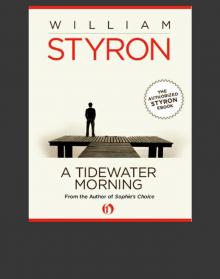 A Tidewater Morning
A Tidewater Morning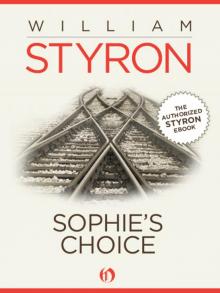 Sophie's Choice
Sophie's Choice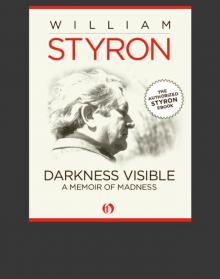 Darkness Visible: A Memoir of Madness
Darkness Visible: A Memoir of Madness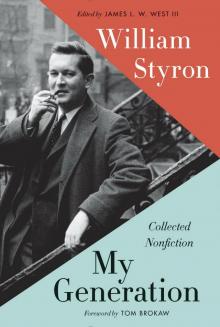 My Generation: Collected Nonfiction
My Generation: Collected Nonfiction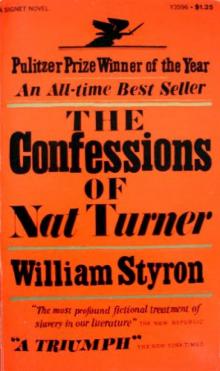 The Confessions of Nat Turner
The Confessions of Nat Turner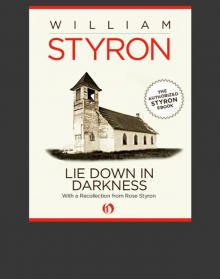 Lie Down in Darkness
Lie Down in Darkness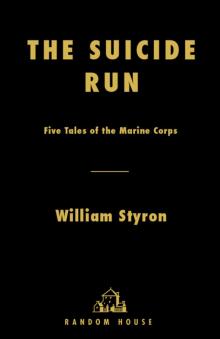 The Suicide Run: Five Tales of the Marine Corps
The Suicide Run: Five Tales of the Marine Corps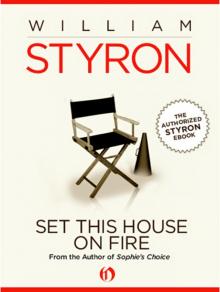 Set This House on Fire
Set This House on Fire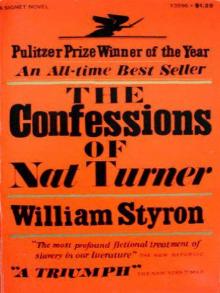 Confessions of Nat Turner
Confessions of Nat Turner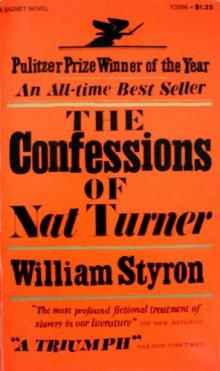 The Confessions of Nat Turner (1968 Pulitzer Prize)
The Confessions of Nat Turner (1968 Pulitzer Prize)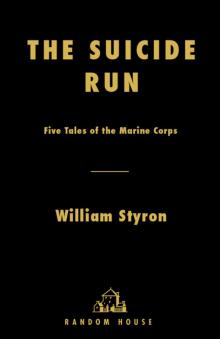 The Suicide Run
The Suicide Run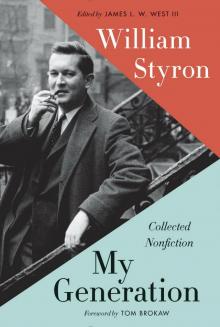 My Generation
My Generation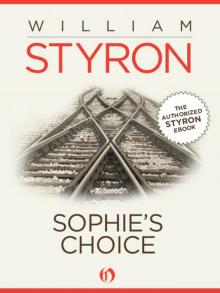 Sophie's Choice (Open Road)
Sophie's Choice (Open Road)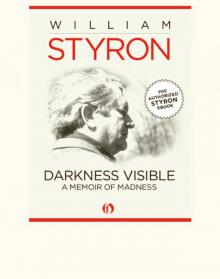 Darkness Visible
Darkness Visible